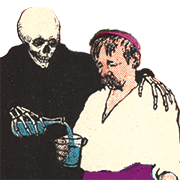|
Balance ecosystems are important. I've been watching the Icon homebrews (yeesh, still mildly dumbfounded that a game that's barely in playtest has such a rabid homebrew community), and my key takeaway is that plenty of the homebrew classes are fine, in a white room, but the 16 classes in Icon are designed with each other in mind. If you allow too many variations on a theme, the game would probably break down. I think any sufficiently min/maxed game requires a Fragged / PHB+1 kind of system.
|
|
|
|

|
| # ? May 23, 2024 21:11 |
|
Tuxedo Catfish posted:who gives players a bunch of mechanical options that obviously and excitingly synergize with each other and then goes "lol no, actually, you'll never have all the pieces for this", and who then acts like that's a good thing and not stupid as hell they don't obviously and excitingly synergize with each other, is the thing. hyphz's example was cherrypicking from a bunch of rulebooks and at least one adventure. it's classic pie-in-the-sky charop bullshit of only looking at the rules elements that make big number and none of the roleplaying or storytelling components of an RPG. the rarity/access system in pathfinder 2e is set up so groups can collectively figure out what kinds of games they want and then tweak the options to fit that. if you're a gnome, you can just choose to grab a flickmace at character creation. that's a gnome thing. your GM isn't gonna take that away from you. the absurdity of hyphz's charop example is how much of this is being assembled, not the basic idea that players should be able to say "hey I'm interested in this stuff, let's work out how I can get it." so when it's uncommon, it's dedicated to a specific social group or area. if you belong to that social group or area, you have access. if the PCs were in the area that the talisman in hyphz's example comes from, it makes sense for them to have access, the rules support that. pathfinder 2e is saying that you don't get automatic access if you're from other places. (then there's rare items, which are explicitly GM-only handouts, and unique items, of which there's only one in the world). the flipside of this is that Paizo was empowered to, and has been doing, unique and fun things to make engaging with specific areas more interesting. the first adventure path ends with the PCs at level 20 in basically planned eugenics dystopian perfect state land, and while the PCs are sorting that out (and the eugenics land is not proposed as something good that the PCs should be approving of, to head off the typical commentary) they can pick up some special training techniques that the perfect people have been practicing as high-level class feats, one per class. (think 4e class power, if you're more familiar with that) just going "okay, these are new feats and anyone can access them forever" would make them way less cool and interesting. instead, story and the rarity/access mechanics combine to make it a specific option that your character gets as part of being in this place and having the opportunity to learn these secrets. the other thing that rarity is used for is that most "problematic" rpg abilities are listed at uncommon or possibly even rare. By problematic I mean Speak With Dead, Zone of Truth, that kind of stuff that people often grouse about ruining plots or sessions or even entire games. That way it's explicitly flagged as something PCs can't automatically access normally and need to talk to their GM about acquiring, so no one's dropping Zones of Truth in the middle of your campaign about investigations and lies. Importantly, rarity and access are always and very specifically stated to be something that is recommended in the books (as an assumed default) but that groups should be adjusting to fit their play style, setting, and ideas of what they want the game to be. If you as a group want Zone of Truth in your investigative game, Pathfinder 2e says go ahead - it's just checking with you first that's what you want. And this kind of thing has been a problem in D&D ever since 2e, when you start getting min-max/munchkins/charop folks who won't accept that things aren't always available or that not everything is always a player option all the time. Whether it's bladedancers or nightsticks or the FR backgrounds or unearthed arcana content, D&D has always had these frictions. So Pathfinder 2e is giving an up front communal tool for groups to sort this out for themselves, then sets up their settings and adventures to facilitate these choices and discussions. Tuxedo Catfish posted:honestly? yeah! a bunch of setting-specific player and GM options that all run on the same core system, or even the same core system with slight rules changes, would be an excellent way to have a supplement treadmill without actually creating an exponential explosion of broken combinations. it's how Fragged * stuff works if you want a real life example! In other words, this is explicitly what the rarity and access system allows Pathfinder 2e to do, because they don't need to worry about two completely disparate disconnected pieces exploding together. They're not printing endless fighter feats or whatever, they're printing some fighter feats and lots of local martial archetypes (multiclass options) for Axe Warriors of the Fuckers Prime or whatever knowing that these pieces only go together in limited ways and that player groups are explicitly responsible for choosing what's of interest to them and focusing on that. It's learning from how most everyone did that already with Pathfinder 1e and how extremely uncoordinated that worked out in a bunch of ways (for example, if you wanted to play a swashbuckler and use a rapier in pf1e you needed a supplement to the rulebook that had the swashbuckler in it, but if you wanted to be a weird swashbuckler and use a longsword instead you were fine with just the swashbuckler rulebook.)
|
|
|
|
this is a really comprehensive answer to me getting grumpy about anti-charop sentiment and i genuinely appreciate you taking the time to make it e: i'm still also pretty skeptical of the decision to unload this work onto individual tables instead of having the developers curate it from the get-go, but that's a much finer objection to a kind of "more flexibility / less work" trade-off, compared to the misinterpretation that i was initially reacting to (that this is the GM unilaterally curtailing things that are presented as universal player options) Tuxedo Catfish fucked around with this message at 19:32 on Feb 14, 2022 |
|
|
|
Arivia posted:so when it's uncommon, it's dedicated to a specific social group or area. if you belong to that social group or area, you have access. if the PCs were in the area that the talisman in hyphz's example comes from, it makes sense for them to have access, the rules support that. The problem is that, as so often happens with this kind of thing, it's writing a cheque it can't cash. The Singing Muse is from the Strength of Thousands adventure path, and when the player wanted to take it, I looked up where it is found to see if it's owned by a bardic guild or something like that. But it isn't. The PCs find one randomly in a box in a thieving gang's safehouse. It's not part of any larger plot and nobody seems to want it back, and there's nothing else about its background in the supplement. You could argue that they're only made in Nantambu I guess, but given that it's a massive city and has a specific export business, that seems a bit of a stretch. (Plus, it's irrelevant because Secrets of Magic tossed in the Orchestral Brooch which does the same thing plus gives an extra bonus, and is common and only two levels higher.) But the uncommonality rule does show another problem, although it's less so: many of the unique abilities for races, etc. are now feats that can be taken by others by paying an additional feat tax. The problem is the wired reflexes problem I mentioned - they are still such good abilities that the tax is worth it, so rather than making the abilities less common or better balanced, increasing the cost just makes the characters that take them less interesting. I've lost count of the number of characters I've seen made which start with Human -> Versatile Heritage -> Adopted Ancestry (Dwarf), Unburdened Iron so that they get Speed 25 in heavy armor, which is better than an actual dwarf.
|
|
|
|
Tuxedo Catfish posted:this is a really comprehensive answer to me getting grumpy about anti-charop sentiment and i genuinely appreciate you taking the time to make it in case it wasn't obvious, the developers do curate it from the get go. things come with rarity tags as they are printed (if something doesn't have a rarity trait it's common). that's why I was deriding the stuff in hyphz's example so much - it's not just in a bunch of different books, it's in a bunch of different books and the individual pieces in those books say "these should have limited access." there are uncommon ancestries (races) and classes, and they are presented up front as "these are not fitting for all games for this or that reason, talk to your GM about how this fits with your group's campaign if you want to play one." and someone playing a hobgoblin isn't gonna ruin your game if you say yes, but the weirder stuff like animated bits of void stuff cloaked in wood (an ancestry) or a gunslinger, yeah, those might not fit.
|
|
|
|
hyphz posted:But the uncommonality rule does show another problem, although it's less so: many of the unique abilities for races, etc. are now feats that can be taken by others by paying an additional feat tax. The problem is the wired reflexes problem I mentioned - they are still such good abilities that the tax is worth it, so rather than making the abilities less common or better balanced, increasing the cost just makes the characters that take them less interesting. I've lost count of the number of characters I've seen made which start with Human -> Versatile Heritage -> Adopted Ancestry (Dwarf), Unburdened Iron so that they get Speed 25 in heavy armor, which is better than an actual dwarf. Speed increases aren't particularly rare and 5 additional speed in heavy armor for two feats certainly isn't anything super special
|
|
|
|
Based on one detailed forum post, that, uh... sounds like a good idea. I like it.
|
|
|
|
hyphz posted:The problem is that, as so often happens with this kind of thing, it's writing a cheque it can't cash. and the adopted dwarf human is still blocked off from getting that gnomish flickmace, so they're still making meaningful choices. you've demonstrated inside of the last week that you're incapable of grappling with the distinction between narrative and pure rules elements that pathfinder 2e goes for with your tirade against the chase subsystem, so frankly listening to you about how you think interpreting rarity/access should work in the world is pointless. it's still absurd to expect the entire party to have the same archetype four times and to spend forty or eighty minutes a day trading talismans to each other to facilitate automatic criticals on Performance checks, whatever talisman is involved. your example was character optimization at the whole party level and is not an indictment of the game or its balance. you have repeatedly shown yourself to be completely and utterly wrong about RPGs at every level and I have no idea why you're let out of the containment thread that was set up so people don't have to listen to your bullshit.
|
|
|
|
Arivia posted:you've demonstrated inside of the last week that you're incapable of grappling with the distinction between narrative and pure rules elements that pathfinder 2e goes for with your tirade against the chase subsystem No, I just think it's stupid to make a chase subsystem which doesn't allow for the pursuer shooting at the person they're chasing. If the intention was that obstacles in the chase are always such that they could not be fired through to hit the target, then that should be in the rules, and borne out in the obstacles appearing in the official APs. If the intention was that uncommon items are restricted to particular areas or backgrounds or situations, then each uncommon item should state those restrictions, and that should be born out in APs. This kind of thing happens a lot in badly written narrative games, and not in well written narrative games, so I don't really consider it to be a issue about narrative/rules balance.
|
|
|
|
I don't know anything about PF2e, but this sounds like a lot of 3e-era arguments about how some feat is overpowered because it's a net gain of 2 points of damage or something.
|
|
|
|
hyphz posted:No, I just think it's stupid to make a chase subsystem which doesn't allow for the pursuer shooting at the person they're chasing. If the intention was that obstacles in the chase are always such that they could not be fired through to hit the target, then that should be in the rules, and borne out in the obstacles appearing in the official APs. If the intention was that uncommon items are restricted to particular areas or backgrounds or situations, then each uncommon item should state those restrictions, and that should be born out in APs. This kind of thing happens a lot in badly written narrative games, and not in well written narrative games, so I don't really consider it to be a issue about narrative/rules balance. I'm not going to quote chapter and verse to you because it's pointless. You cannot be reasoned with or discuss things with honestly like someone who's actually engaging in good faith. Even if you are engaging in good faith, you won't actually listen to anyone, and you've been showing that for months. So I will just say for everyone else's benefit that these contentions are clearly spelled out in the text of the relevant rules and materials in Pathfinder 2e itself, and the fault is solely on hyphz for his inability to read and comprehend the rules of Pathfinder like he has so many other games. Now I'm going to stop responding to him, because it's not doing anything good for anyone.
|
|
|
|
Siivola posted:This is a really weird design standard, by the way. 45% of attack actions whiffing entirely is a lot! "PCs should fail routine tasks about 50% of the time" seems to be a really common design goal, and I'm not sure why -- if they're "routine" the player characters should be succeeding way more often than they fail, especially in games where they're meant to be a cut above the rest of humanity. My best guesses are (a) designers¹ lazily conflate "average" as in "the most typical" and "average" as in "median", so "an average task" is both the kind you'll be encountering most often and the kind you have about a 50% chance of succeeding at (b) in an even matchup it should be 50/50 who wins, and most encounters should be even matchups, and if the outcome is 50/50 that means each individual test that leads to that outcome should be as well ¹ I'm actually not sure to what extent this is a problem with games being designed for a 50% failure rate, and to what extent it's a problem with GMs ignoring advice in the sourcebook and tuning encounters to get a 50% failure rate
|
|
|
|
hyphz posted:No, I just think it's stupid to make a chase subsystem which doesn't allow for the pursuer shooting at the person they're chasing.
|
|
|
|
ToxicFrog posted:"PCs should fail routine tasks about 50% of the time" seems to be a really common design goal, and I'm not sure why -- if they're "routine" the player characters should be succeeding way more often than they fail, especially in games where they're meant to be a cut above the rest of humanity. Well, in PF2s case the system expects you to use teamwork, buffs and debuffs to increase the hit rate. That's kind of what the combat is all about (along with positioning and action economy management).
|
|
|
|
It also sounds like Paizo made an attempt at fleshing out a system/assumption that has been part of D&D and even some other RPGs forever, just left as a nebulous "it should be rare.." without a baseline comparison in other games. Even 4e had dragonmarks and plaguewhatevers the Forgotten Realms equivalent was, and plenty of character options not designed to interact with each other explicitly limited by "eh talk to your gm about this before using them" oWoD had backgrounds like Purebreed/Ancestry, Generation, and other "This is only beneficial and clearly way better than other uses of these points, but the GM should decide if you can take it and how much." I remember one vampire splat even introduced a an optional background score that reflected just plain being a more powerful ancient vampire.
|
|
|
|
Coolness Averted posted:It also sounds like Paizo made an attempt at fleshing out a system/assumption that has been part of D&D and even some other RPGs forever, just left as a nebulous "it should be rare.." without a baseline comparison in other games. In general "uncommon" stuff in PF2 isn't that way because it is mechanically too strong, it's just because it's something weird/rare in-universe (with stuff like Zone of truth etc. being exceptions like Arivia mentioned). So far PF2 has mostly avoided stuff that is insanely broken or stronger than everything else to an obtrusive degree. Some stuff synergizes better, some stuff worse but it's to a reasonable degree. There's plenty of time to still gently caress that up though!
|
|
|
|
Andrast posted:In general "uncommon" stuff in PF2 isn't that way because it is mechanically too strong, it's just because it's something weird/rare in-universe (with stuff like Zone of truth etc. being exceptions like Arivia mentioned). Yeah that’s pretty much it. I’m not expecting Paizo to keep the system perfect forever, I’m sure there will be growing pains and poo poo that’s bad or overpowered or whatever as time goes on. But what has been really impressive since the beginning of the 2e playtest was their willingness to actually look at what works and what doesn’t work, to make changes to fix things, and to focus on making a good game that’s fun to play for what they want it to do. I don’t think there’s been a single playtest period yet that’s gone without acknowledging something didn’t work or didn’t meet expectations, and then actually working to fix it. (Or going “we’ll need to handle this differently with specific attention paid to it” for the synthesist summoner.) So when I acknowledge something’s not going to work, the clarity of systems and useful basic design makes it much easier to grapple with than it was in 3e or PF1e or whatever.
|
|
|
|
Arivia posted:the other thing that rarity is used for is that most "problematic" rpg abilities are listed at uncommon or possibly even rare. By problematic I mean Speak With Dead, Zone of Truth, that kind of stuff that people often grouse about ruining plots or sessions or even entire games. That way it's explicitly flagged as something PCs can't automatically access normally and need to talk to their GM about acquiring, so no one's dropping Zones of Truth in the middle of your campaign about investigations and lies. Perhaps if something is broken enough to completely annihilate the game's balance/invalidate certain types of play that the game is intended to support and need big "WARNIGN! WARNING! DO NOT USE!"-stickers, perhaps they should simply not be in the game or should be rebalanced. If I as a GM need to carefully take half the game, analyze if it will utterly destroy the other half, and then bin the sections that won't work... I would feel like it was a badly designed game! Andrast posted:Well, in PF2s case the system expects you to use teamwork, buffs and debuffs to increase the hit rate. That's kind of what the combat is all about (along with positioning and action economy management). Personally I dislike the whole thing where players need to build a careful jenga tower of bonuses simply to land a shot somewhere. I mean it's cool if they want to do it for some exceptionally complex task like putting a bullet in Elon Musk's head from the vicinity of Saturn, but if it's just to plug some cop on the other side of the street, dear God. Yet some systems seem to be built around this with a ~50% average success rate and then a long list of things you can do to improve that(half of which you will be doing almost every time, anyway, and which thus simply constitute a ritual phrase of praying for success rather than a meaningful choice) which you will have to engage with. PurpleXVI fucked around with this message at 20:50 on Feb 14, 2022 |
|
|
|
I agree, D&D should have been given up on sometime in the 2000's.
|
|
|
|
PurpleXVI posted:Perhaps if something is broken enough to completely annihilate the game's balance/invalidate certain types of play that the game is intended to support and need big "WARNIGN! WARNING! DO NOT USE!"-stickers, perhaps they should simply not be in the game or should be rebalanced. I don't think it needs a lot of brain power from the gm to go "hey maybe let's not have the spell where we can talk to the dead in our adventure centered around a murder"
|
|
|
|
dwarf74 posted:That's pretty much the norm in the other chase systems I've seen - Savage Worlds and Feng Shui, at least. There's restrictions on when ranged combat can happen, and even tighter ones on when melee can happen. I just had a look at SWADE and it’s pretty clear on how you translate chase cards into range increments for ranged weapons. PF2e doesn’t have that!
|
|
|
|
PurpleXVI posted:Perhaps if something is broken enough to completely annihilate the game's balance/invalidate certain types of play that the game is intended to support and need big "WARNIGN! WARNING! DO NOT USE!"-stickers, perhaps they should simply not be in the game or should be rebalanced. Okay, here's an actual breakdown of what rarities are like in PF2e in practice. Common: This is the basic, core stuff that's everywhere. Wizards and clerics and fighters and +1 longswords and all of that. This is the tier you can use in Pathfinder Society by default, because Pathfinder Society is boring that way. Uncommon: This stuff is all basically balanced mechanically. If your group is cool and aren't fantasy purists you can mix it all together and it'd probably be fine, but it could be a bit weird in some campaigns so asking people to not take specific uncommon things isn't that weird. (ie "this is a big divine campaign against a devil invasion, a tiefling PC would feel kind of weird" or "I don't want guns in Cheliax aesthetically, please don't make a gunslinger") Rare: This is where things get janky, sometimes in ways that change the basic plot of the party. Sometimes it's janky fictionally (like the ancestry about being a horribly gross science experiment, or the background for being a runaway prince). Sometimes it's janky mechanically (like the background where you were rescued by merfolk and now you can breath water, which is either going to be incredibly powerful or incredibly useless). Either way, it's where things get weird and you'd want that explicit permission. It's also the rarest tier. Also, if something's in a more obscure book like a random adventure path, it's probably going to be knocked up a tier or two. The point is, you're really overestimating how broken things mechanically and how common those broken things are in PF2e's rarity system.
|
|
|
ToxicFrog posted:"PCs should fail routine tasks about 50% of the time" seems to be a really common design goal, and I'm not sure why -- if they're "routine" the player characters should be succeeding way more often than they fail, especially in games where they're meant to be a cut above the rest of humanity. I believe someone once did a study and determined that a challenge that the average game player would consider challenging but "fair" is actually closer to 65-75% chance of success, rather than 50/50, since people tend to feel more strongly about the failures than the successes and they have an outsized psychological impact that needs to be balanced out. It's like how in the Firaxis X-COM games the percentages displayed for a shot landing are actually lower than the real mechanical probability because it FEELS like it's less fair than it is and the designers account for that a little. So in D&D's case, a DC10 check feels fair, assuming you have about a +3 or +4. So basically it feels fair and average if it's something you're already good at.
|
|
|
|
|
Somewhat relevant: A client of mine needs a new 5e senior game designer/writer and asked me for recommendations. I don't really pay attention to 5e, so I've got mostly nothing. Are there any goon-respected designers (or publishers, they're open to co-publishing) doing cool, good work in the, albeit limited, 5e space? Anyone who makes 5e content that indie roleplayers who wouldn't normally approach D&D might be intrigued to check out (and who might avoid the worst of 5e's design pitfalls)?
|
|
|
|
Andrast posted:Speed increases aren't particularly rare and 5 additional speed in heavy armor for two feats certainly isn't anything super special I think this does, at least indirectly, touch on a legitimate problem within the D&D/Pathfinder design space - When the game is designed such that it has a lot of mix and match abilities and options there's going to eventually emerge certain combinations that are just mechanically more effective than others, which can be frustrating when the most effective mechanical combinations aren't in line with what the character wants to play from a narrative perspective. I've said before that I've little familiarity with the PF 2e ruleset, but I did notice at least a little bit of this issue from what I've seen of the character design process: While I appreciate the fact that your character gets different bonuses from both their ancestry and background, the fact that your starting character stats are tied to the boosts and flaws you get from those two choices, and some of these boosts and drawbacks are fixed, means that some class/ancestry/background combinations are going to be less mechanically effective than others, which can in turn be kind of a bummer for a player who has a cool concept for a character that makes sense narratively but isn't optimal mechanically. The counterpoint, of course, is that systems like this are usually so broad in the range of options they present that it's not really reasonable to expect all combinations of the options presented to be equally viable, if only because there are so many possible combinations.
|
|
|
|
KingKalamari posted:The counterpoint, of course, is that systems like this are usually so broad in the range of options they present that it's not really reasonable to expect all combinations of the options presented to be equally viable, if only because there are so many possible combinations. I think the counterpoint is rather that there's no virtue in a system simply being broad. Narrow it down a bit, find a focus, figure out what it wants to be. If the system genuinely wants to be about solving mysteries? Remove or limit zone of truth/speak with dead. Perhaps the setting will work perfectly well with, say, five classes that each of a clear mechanical niche and perhaps only five groups of playable sapients, rather than a hundred of each. Obviously if you try to cram in everything, some things won't work. Obviously if you try to have an insane amount of options, some of them will be busted. So simply do not try those things, and have a better system for it.
|
|
|
|
The crux of it is that good design isn't compatible with a product line stretching into dozens of books of player options.
|
|
|
|
KingKalamari posted:I've said before that I've little familiarity with the PF 2e ruleset, but I did notice at least a little bit of this issue from what I've seen of the character design process: While I appreciate the fact that your character gets different bonuses from both their ancestry and background, the fact that your starting character stats are tied to the boosts and flaws you get from those two choices, and some of these boosts and drawbacks are fixed, means that some class/ancestry/background combinations are going to be less mechanically effective than others, which can in turn be kind of a bummer for a player who has a cool concept for a character that makes sense narratively but isn't optimal mechanically. This was especially the case in the playtest, where races other than humans didn't get a free boost, so certain races would be inevitably disadvantaged in certain classes. The released version added the free boost so that you can always have your prime requisite high unless your ancestry has a specific flaw in it.
|
|
|
|
CitizenKeen posted:Balance ecosystems are important. For Lancer I've seen some homebrew-allowing campaigns use a "one homebrew allowed" system per mech. So for example you can use any Massif-official stuff, but if you choose to add in homebrew from Intercorp, it's incompatible with Guide to Suldan. It's usually reasonable since the bigger/better homebrewers have tested the pain points of mixing their stuff with the base game but obviously aren't going to test it against other homebrew.
|
|
|
|
hyphz posted:This was especially the case in the playtest, where races other than humans didn't get a free boost, so certain races would be inevitably disadvantaged in certain classes. The released version added the free boost so that you can always have your prime requisite high unless your ancestry has a specific flaw in it. And even then they added the option to lower other stats to turn the flaw into a +2, so if you want a halfling with 18 strength or similar for a character you can do that at a cost at least.
|
|
|
|
hyphz posted:This was especially the case in the playtest, where races other than humans didn't get a free boost, so certain races would be inevitably disadvantaged in certain classes. The released version added the free boost so that you can always have your prime requisite high unless your ancestry has a specific flaw in it. every race got a free boost in the playtest
|
|
|
|
PurpleXVI posted:I think the counterpoint is rather that there's no virtue in a system simply being broad. Narrow it down a bit, find a focus, figure out what it wants to be. If the system genuinely wants to be about solving mysteries? Remove or limit zone of truth/speak with dead. Perhaps the setting will work perfectly well with, say, five classes that each of a clear mechanical niche and perhaps only five groups of playable sapients, rather than a hundred of each. I think having a lot of variety and options is fun. Hell, having an option for charop is fun and making a mechanically synergistic character/party is satisfying. Not everything needs to be 100% super balanced as long as the core mechanics are good and stuff doesn't get too out of hand. Pathfinder also does have a focus: It's a crunchy system with an emphasis on tactical combat and dungeon delving, you know like Dungeons & Dragons. People often hone in way too much on the "if you want a game about mystery solving just run this game specifically made for mysteries" thing, sometimes you might just want some light mystery solving during your normal adventures. Like, maybe there's a cult doing some murders and you need to know where their base is so you can go gently caress them up. Having speak with dead available there could be a problem or it might just be a fun way to get some info, depends on the situation. I certainly do not see what would really be gained by removing it entirely.
|
|
|
|
Ace Attorney shows that being able to commune with the dead does not preclude the ability to tell a mystery story. That said, lol @ the existence of so many spells in D&D and its derivatives that boil down to "I, the player, do not want to have to use my brain so I am cast spell to make problem go away now"
|
|
|
|
Runa posted:Ace Attorney shows that being able to commune with the dead does not preclude the ability to tell a mystery story. To be fair that is arguably intentional from the beginning, each of the 4 "Core" classes specializes in dealing with problems, Fighters and Thieves through combat and Thief Skills respectively, since theirs are unlimited in use they have a possibility of danger and failure to them, same with Undead Turning for Clerics, while Spells for both Clerics and Wizards have minimal chance for failure but are limited in both how many they can have and how often each one can be used(as well as Clerics not getting any until Level 2 in older editions) Mind you how balanced this is in the actual execution(particularly for editions not made by TSR) is far from perfect or even great but it is there
|
|
|
|
Halloween Jack posted:The crux of it is that good design isn't compatible with a product line stretching into dozens of books of player options. e: also my problem in mystery plots is that I tend to assume my players will speak to the dead as a matter of course to the extent that the plot will hinge entirely upon them doing so My Lovely Horse fucked around with this message at 09:29 on Feb 15, 2022 |
|
|
|
Runa posted:Ace Attorney shows that being able to commune with the dead does not preclude the ability to tell a mystery story. I actually think more games should have "my character could solve this, don't make me read the GM's mind or personally demonstrate I can bend these bars/give a rousing speech/keep this person from dying to allow my character to do it." It's just a shame a d&d staple is giving certain classes so much narrative control and relative flexibility, while allowing others to carry stuff or ultra specialize into doing 1 thing well if the GM allows it.
|
|
|
|
Runa posted:Ace Attorney shows that being able to commune with the dead does not preclude the ability to tell a mystery story. Maya never got to be possessed by anyone other than Mia though
|
|
|
|
My Lovely Horse posted:Not even D&D 4E survived being expanded into multiple splatbooks, Dragon magazines and campaign settings, let alone a whole passive-aggressive reboot There are plenty of reasons speak with dead might not be a reliable tool in a mystery plot. First and most obvious, a mystery doesn't have to be a murder mystery--if nobody's dead, speaking to the dead is of limited usefulness. I don't know the exact specifics of the system you're using and its particular flavor of speak with dead, but it's reasonably common for the spell to require the body of the dead person in question, so proper corpse disposal can add a layer of challenge. Likewise, if the spell limits the number of questions you can ask the dead, you might still be missing vital context if all you get is the name of the person who killed them. Then, of course, the dead might not be omniscient--if the victim was koshed on the back of the head, drank poisoned wine, or died in a "tragic hunting accident," they might not know who killed them. If the PCs are acting as agents of a justice system and thus have to care about due process, maybe there's a reason postmortem witness statements are inadmissible in court. And, of course, unless the spell in question obligates the shade to tell the truth, the dead might lie to you, just like any character involved in a mystery story. Maybe the victim was actually killed by their brother, for example, but the ghost cares less about justice than ruining their hated business rival, and sees a bunch of well-armed spellthugs poking around into their death as the perfect opportunity. More broadly, assuming you're talking about a setting like your typical D&D world, where people can be reasonably expected to be aware that the possibility of someone speaking with a dead person as part of an investigation, that's going to shape both the methods and motives for murders. If a dead person can be communed with, or raised from the dead, or whatever, killing people to silence them is no longer a good idea. So consider how your very clever criminal would adjust their methods and approaches, and how speaking with the dead to get the name of the killer isn't necessarily the simple, clean-cut solution to an interesting mystery. (And yes, obviously there are still going to be dumb murderers and ones who acted in a panic or whatever and it's very easy to solve the case by speaking with dead at the victim and asking whodunit, but those are not the crimes around which you build a murder mystery, any more than Agatha Christie writes novels where the crime is a straightforward "argument escalated to violence, a dozen witnesses saw the killer pull a gun and shoot the victim in the middle of the bar.")
|
|
|
|
Plutonis posted:Maya never got to be possessed by anyone other than Mia though Wasn't the dude that used to be in gradenko' av a dead guy temporarily reanimated to give testimony at his own murder trial?
|
|
|
|

|
| # ? May 23, 2024 21:11 |
|
Coolness Averted posted:I actually think more games should have "my character could solve this, don't make me read the GM's mind or personally demonstrate I can bend these bars/give a rousing speech/keep this person from dying to allow my character to do it."
|
|
|




































